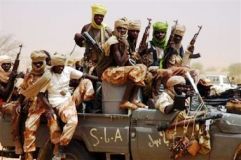Daunting task to unify Darfur rebels
August 1, 2007 (NAIROBI) — With a 26,000-strong force now authorised by the United Nations to police Sudan’s Darfur region, diplomats this weekend turn to the difficult task of bringing unity to the rebel side of the four-year-old conflict.
 The aim at talks starting on Friday in Arusha, Tanzania, will be to get roughly a dozen rebel factions to agree on a common platform for peace talks with the government and to decide where and when those will happen.
The aim at talks starting on Friday in Arusha, Tanzania, will be to get roughly a dozen rebel factions to agree on a common platform for peace talks with the government and to decide where and when those will happen.
Getting agreement among the rebels has taken on new importance since the U.N. Security Council on Tuesday approved deployment of the joint U.N. and African Union force to quell violence in Darfur.
U.N. envoy Jan Eliasson and African Union counterpart Salim Ahmed Salim have been pushing hard to get the rebels to the table, but persuading them to agree a deal that could lead to a comprehensive peace pact for Darfur is a daunting task.
Even getting the rebels to Arusha is a logistical challenge, let alone trying to get them to bridge internal divisions.
Talks are also likely to take place without one major player, Sudan Liberation Movement faction leader Abdel Wahed Mohamed el-Nur, who has spurned calls from the African Union and United Nations to attend.
Although Nur does not have a lot of troops, his popular support among refugees and other Darfuris gives him a power that diplomats say is crucial to unifying rebels fighting in the remote area the size of France.
“It’ll be really important for him to come. When you talk to people on the ground … he still carries a lot of weight. He’s the one who can give the blessing and say now is the time,” said Sally Chin, a Sudan analyst with the International Crisis Group.
AID PROBLEMS
International experts estimate that 200,000 people have been killed and 2.5 million driven from their homes in the conflict which erupted in 2003 when mostly non-Arab rebels took up arms against the Khartoum government, accusing it of neglect.
Aid groups say the rebels must take the talks seriously and agree a ceasefire that will allow aid workers to help Darfuris.
“We would encourage all key stakeholders, all players, to come to the table and iron out their differences,” said Beatrice Karanja, aid group Oxfam’s spokeswoman in Nairobi.
One faction of the rebel Sudan Liberation Army (SLA) signed a peace agreement in Nigeria in 2006, but other groups have refused to take part and Darfuris have roundly rejected it.
The future of that deal depends on what happens in Arusha, Chin said. Many factions want the agreement scrapped.
The SLA and other rebel groups have differing demands and have splintered again and again, multiplying the difficulty of the diplomatic task at hand
“It’s not clear whether the political and military leaderships are unified and this could be a stumbling block for the future,” Chin said.
Khartoum may hold a key to solving that problem if it allows SLA humanitarian coordinator Suleiman Jamous to travel to the talks and for urgently needed medical treatment, Sudan experts say.
Jamous, who was the main liaison between the world’s largest aid operation and Darfur rebels, has been virtually imprisoned for 13 months in Darfur under threat of arrest. He was credited with keeping looting of aid convoys down and aid workers safe.
But Khartoum calls the elderly rebel a terrorist.
Eleven prominent international activists have called on Sudanese President Omar Hassan al-Bashir to let Jamous travel. He has told Reuters he could bring together the factions and most importantly their field commanders.
(Reuters)
